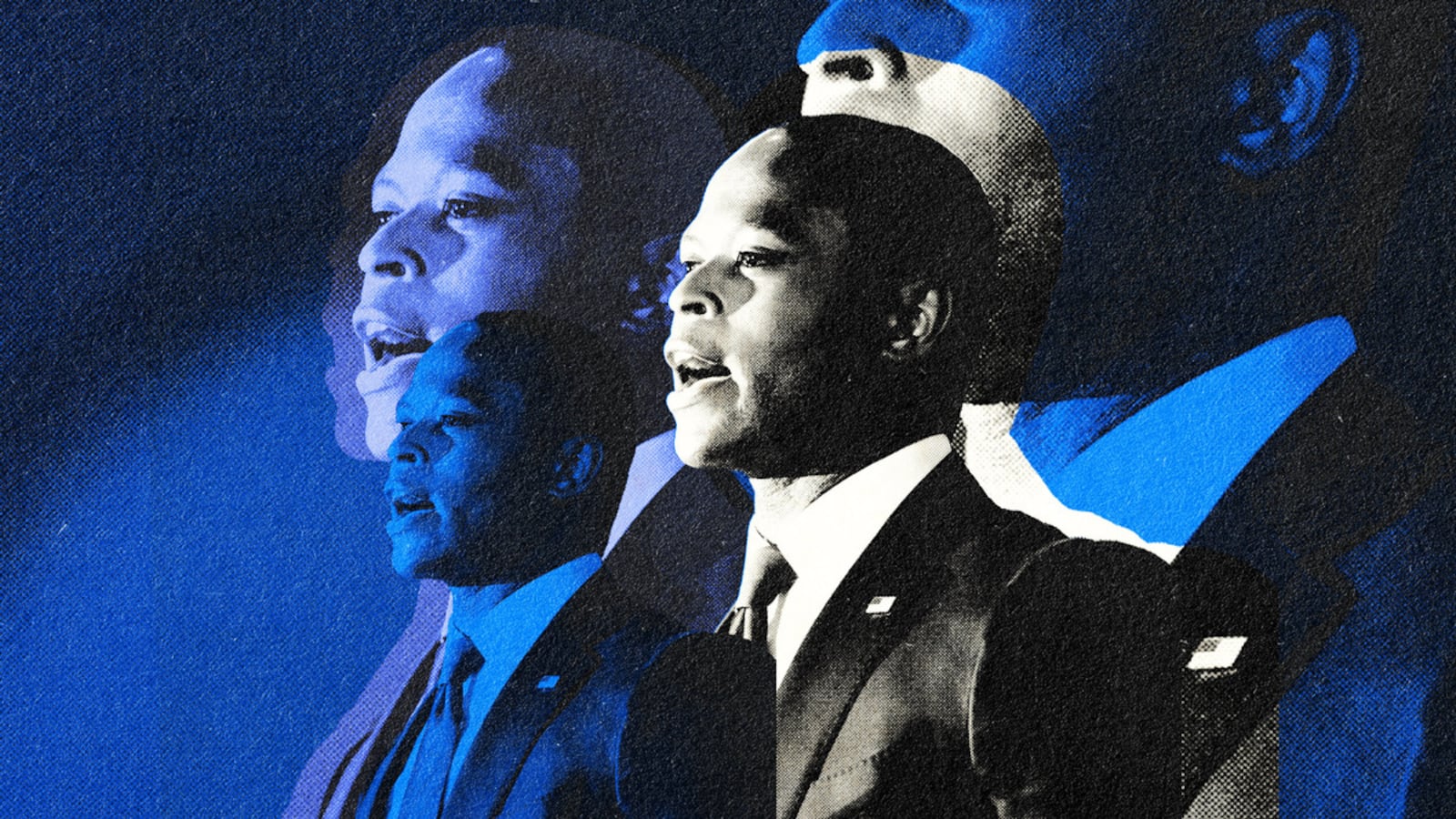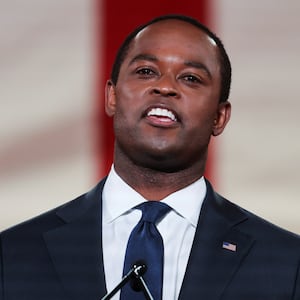Kentucky Attorney General Daniel Cameron’s office has settled on a defense to explain the donations at the center of the escalating campaign finance and ethics scandal overshadowing his gubernatorial campaign.
The only problem? That defense has some major inconsistencies.
In response to a letter on Friday from the Kentucky Democratic Party requesting an FBI investigation into Cameron, the state AG’s office issued a statement claiming Cameron recused himself from the state probe into an addiction recovery center “immediately” after becoming aware that company officials had donated to his campaign.
But according to the company, Edgewater Recovery Center, Cameron should have been aware of the donations all along; he first personally solicited the company in January—four months before recusing from the matter—then personally asked for money again in March, just before his office subpoenaed the company. (The investigation was opened sometime in 2022 and appears to be in its final stages, The Daily Beast previously reported.)
After Cameron’s initial outreach, Edgewater began talks with his campaign about hosting a fundraiser, with those talks starting Jan. 20, according to a statement Edgewater’s general counsel gave to The Daily Beast.
Cameron now claims that the fundraiser was subsequently canceled, according to a statement on Monday to the Associated Press, after he was “made aware” of the potential conflict of interest.
“Once we were made aware of a conflict, the event was canceled. When they later made online contributions, I recused myself and the contributions were refunded,” Cameron said.
However, a person familiar with the matter told The Daily Beast that Cameron did not in fact call off the fundraiser. The event “was never canceled, just never finalized,” this source said. Asked whether Cameron or the campaign ever signaled to the company or its employees that it didn’t want to go forward with the prospective donations, the person replied that they “never said anything like that.”
Cameron’s timeline of events also seems to contradict Edgewater’s version.
According to Edgewater, Cameron initiated the fundraising beginning in January. He then had two more months to perform due diligence and deconflict the donations, but he still solicited the money himself in March. Cameron also apparently didn’t take steps to alert his campaign that it shouldn’t accept money from this company that was under investigation—a company Cameron had just personally asked for contributions. (One of the donors, Edgewater medical director William Fannin, is mentioned by name in Cameron’s May 19 notice of recusal.)
Cameron only recused himself from the case two months after the donations came in, doing so a week after winning the primary election that the money was designated to fund. He submitted the recusal notice two days after his office received a public records request inquiring about all of Cameron’s recent recusals.
It then took another month for the Cameron campaign to return the contributions, which it did days after receiving another public records request for details about the case—three months after receiving the Edgewater funds, and five months after the campaign first contacted the company about providing financial support.
“On January 20, 2023, a few people associated with Edgewater, including myself, had a call with Daniel Cameron’s campaign about holding a fundraiser for him, and continued communication with them through March to schedule this fundraiser,” Edgewater general counsel Ashley Adkins wrote in an email to The Daily Beast. “It was in March that Daniel Cameron called and personally asked for a donation.”
The email added that Cameron’s office subpoenaed Edgewater the same month he asked for the contributions. The Associated Press reported on Monday that Edgewater had received the subpoena in early March, prior to the planned fundraiser, but after Cameron personally solicited the donations.
While the company had not yet received an official complaint, Adkins said the company would soon file an open records request for more details.
The investigation into Edgewater centers around its billing practices, according to records obtained by The Daily Beast.
The Edgewater scandal could become a flashpoint in Cameron’s race for governor, directly undermining his own accusations against current Democratic Gov. Andy Beshear. And Cameron’s tortured timeline could blow up in his face if it fails to convince voters—or the FBI—under scrutiny.
Last week, Kentucky deputy attorney general Vic Maddox claimed Cameron recused himself from the Edgewater Recovery probe “immediately” after he became aware of the donations.
“Immediately after learning of the contributions, on May 19, 2023, General Cameron recused himself from any decisions regarding any possible investigation involving the Edgewater organization,” Maddox wrote, adding that Cameron “has the highest regard for ethics laws and opinions, and will continue to do so.”
Neither the OAG nor a Cameron spokesperson immediately replied to The Daily Beast’s request for comment. Edgewater counsel in the matter directed The Daily Beast to the Associated Press report and declined further comment.

Beshear campaign spokesperson Alex Floyd told The Daily Beast in a statement that Cameron “must be investigated” and accused the OAG of dodging its ethical duty out of an interest to “protect” the rising GOP star.
“The timing is clear—Daniel Cameron personally called a business he was investigating and solicited campaign contributions. His actions are unethical and must be investigated. The Attorney General’s Office has an obligation to refer Cameron’s actions to the FBI, but has refused in order to protect Cameron,” the statement said.
In Edgewater’s email to The Daily Beast, Adkins—the company general counsel who gave Cameron $700 on March 17, then another $700 one month later—explained that the employees made the contributions “because Daniel Cameron supports individuals in recovery through reentry and rebuilding communities.”
Beyond Adkins and Fannin, the donors include Edgewater’s owner, John David Elam, as well as the directors of its clinical and human resource divisions. In all, Edgewater employees gave Cameron a combined $6,900 between March 16 and April 17, according to Kentucky campaign finance records. No Edgewater employee had previously contributed to Cameron. (An Edgewater compliance employee donated $300 to Beshear on May 11, state filings show.)
The OAG’s office declined to release the case file when asked, citing possible harm to a mature investigation that included witness testimony, subpoenas, sealed court filings, and pending decisions about penalties or potential criminal charges, The Daily Beast previously reported.
Last week, Cameron asked the FBI to investigate the “circumstances surrounding” a combined $200,000 in contributions to the Kentucky Democratic Party and Beshear’s campaign. The donations came in the names of multiple people but were tied to one credit card—the product of a previously reported bundling effort by a Kentucky Republican mayor supporting Beshear. The campaign and the KDP returned the excess amounts before Cameron’s FBI referral.
Earlier this year, Cameron recused himself from a lawsuit involving gaming company Pace-O-Matic, which had contributed $100,000 to his election effort days before filing the legal action against the state. A total of 16 Pace-O-Matic executives and their family members separately gave nearly $30,000 directly to Cameron’s campaign, with all 16 contributions coming the day before the lawsuit was filed, the Louisville Courier-Journal reported.
Those donations came in late March, weeks after Cameron allegedly first learned about the Edgewater conflict.
Adkins’ email noted that Edgewater has a history of bipartisan cooperation and is willing to work with “anyone who supports individuals in recovery,” including Beshear, who Adkins noted has “made huge strides to assist individuals in recovery from substance use disorder.”
She also pointed to House Bill 248, an effort to provide quality standards for recovery housing, sponsored by Republican state Rep. Samara Heavrin.
“We worked closely with Representative Heavrin, regardless of party, because it was the right thing to do for the people we serve—people in recovery,” the email said.







